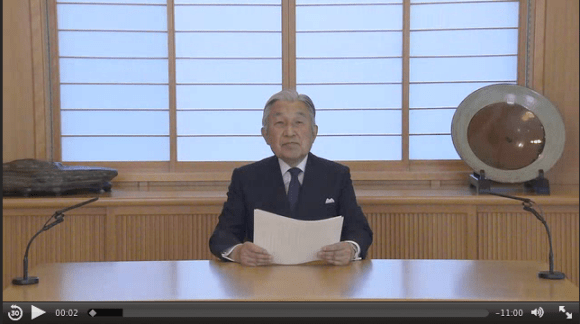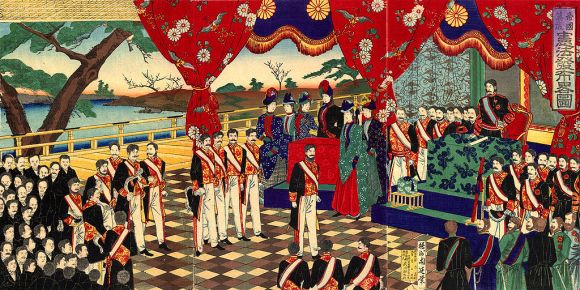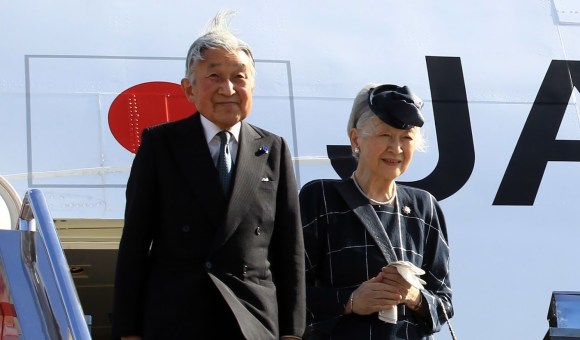
The Emperor’s decision to break his silence on the controversial issue has sparked considerable debate and contemplation in Japan.
It’s been nearly a month since rumors of the Emperor’s wish to abdicate emerged, sending shockwaves and feelings of uncertainty throughout Japan. Many in the country have either refrained entirely from commenting on the politically delicate issues surrounding this news or tread lightly when doing so, reflecting the respect with which Emperor Akihito is still widely-regarded.
On August 8th, Emperor Akihito broke his silence, however, appearing in a video message that alluded to the possibility of resignation. Under the current system encoded in the Japanese Constitution, this isn’t normally possible, and many commentators have remarked that the process to reverse this rule would be very difficult.
▼ You can watch the Emperor Akihito’s message below.
At the beginning of the video, which runs about 11 minutes long, the Emperor Himself remarks that as the Emperor he “must refrain from remarking on the existing Imperial system.”
He proceeds to reflect on his legacy, having passed the age of 80 and fulfilling his role as the living symbol of Japan for the last 28 years. He addresses the audience as “an individual, rather than Emperor,” and the tone of the video is very personal, dealing frankly with his health and advancing age.
In the recent past, he has referred to the burden of performing the ceremonial duties that come with being Emperor at his age, particularly after undergoing several surgeries in the last several years. The video again touches on these themes, as well as his own reflections on his relationship with the people of Japan.
Abdication of the throne is without precedent in modern history, though it was not at all uncommon for emperors in the past. Those that did so would frequently retire to take the tonsure to become monks — some of them would continue to wield political influence even after doing so. The last Emperor to yield his position while alive was about two centuries ago, when most Japanese emperors played only a marginal, ceremonial role in public life.
▼ The Meiji Constitution changed the Emperor’s status in Japan in a big way.
With the Meiji Restoration in 1867 and the announcement of the Meiji Constitution in 1889, the Emperor was elevated to a position of extraordinary political and symbolic significance, albeit a diminished one following the end of the Second World War and the introduction of the post-war constitution.
▼ The Emperor and the Empress traveled to the Philippines earlier this year.
Still, it remains shocking to many in Japan that the Emperor would ever leave the throne during his own lifetime. Meanwhile, some observers have speculated that the Emperor’s recent actions could point to his displeasure with the direction of political discourse in the country. Though it’s impossible to say for sure, the Emperor in the past has appeared repeatedly in public to denounce the loss of life during the Second World War, traveling in recent years to places like Palau and the Philippines to honor those that passed away during the brutal conflict.
An English-language transcript of the full video is available here.
Sources: NHK, Kunaicho
Top Image: 宮内庁ホームページ/Video
Images: Wikimedia Commons/Toyohara Chikanobu, Wikimedia Commons/Malacanang Photo Bureau



 Japanese Emperor’s abdication date to be decided next month, expected later than initial reports
Japanese Emperor’s abdication date to be decided next month, expected later than initial reports Japanese Emperor abdication date revealed by government officials in new report
Japanese Emperor abdication date revealed by government officials in new report Japanese Emperor’s abdication date set, end of Heisei era now officially on the horizon
Japanese Emperor’s abdication date set, end of Heisei era now officially on the horizon Emperor of Japan abdicates throne, issues final imperial statement to people of Japan【Video】
Emperor of Japan abdicates throne, issues final imperial statement to people of Japan【Video】 Japan’s new emperor ascends to throne, makes first speech with wish for peace, happiness
Japan’s new emperor ascends to throne, makes first speech with wish for peace, happiness “25 Potential Culture Shocks from around the World” infographic offers tidbits of travel wisdom
“25 Potential Culture Shocks from around the World” infographic offers tidbits of travel wisdom Survey finds that one in five high schoolers don’t know who music legend Masaharu Fukuyama is
Survey finds that one in five high schoolers don’t know who music legend Masaharu Fukuyama is Highest Starbucks in Japan set to open this spring in the Tokyo sky
Highest Starbucks in Japan set to open this spring in the Tokyo sky Family Mart’s Shibuya Cat Street shop hosts first-ever rescue cat photo exhibition for Cat Day
Family Mart’s Shibuya Cat Street shop hosts first-ever rescue cat photo exhibition for Cat Day Starbucks Japan complexly raises prices, will now charge for takeout bags
Starbucks Japan complexly raises prices, will now charge for takeout bags Giant Clodsire Pokémon plushie comes with up to 32 Woopers in super size, super cute set【Pics】
Giant Clodsire Pokémon plushie comes with up to 32 Woopers in super size, super cute set【Pics】 Osaka establishes first designated smoking area in Dotonbori canal district to fight “overtourism”
Osaka establishes first designated smoking area in Dotonbori canal district to fight “overtourism” Saitama is home to the best strawberries in Japan that you’ve probably never even heard of
Saitama is home to the best strawberries in Japan that you’ve probably never even heard of Street Fighter cafe now open in Tokyo for fans hyped and hungry for SF6 launch/lunches
Street Fighter cafe now open in Tokyo for fans hyped and hungry for SF6 launch/lunches Starbucks Japan unveils new Sakura Frappuccino for cherry blossom season 2025
Starbucks Japan unveils new Sakura Frappuccino for cherry blossom season 2025 The 10 most annoying things foreign tourists do on Japanese trains, according to locals
The 10 most annoying things foreign tourists do on Japanese trains, according to locals Starbucks Japan releases new sakura goods and drinkware for cherry blossom season 2026
Starbucks Japan releases new sakura goods and drinkware for cherry blossom season 2026 Naruto and Converse team up for new line of shinobi sneakers[Photos]
Naruto and Converse team up for new line of shinobi sneakers[Photos] Is Sapporio’s Snow Festival awesome enough to be worth visiting even if you hate the snow? [Pics]
Is Sapporio’s Snow Festival awesome enough to be worth visiting even if you hate the snow? [Pics] Japan has trams that say “sorry” while they ride around town…but why?
Japan has trams that say “sorry” while they ride around town…but why? Tokyo Skytree turns pink for the cherry blossom season
Tokyo Skytree turns pink for the cherry blossom season Sakura Totoro is here to get spring started early with adorable pouches and plushies
Sakura Totoro is here to get spring started early with adorable pouches and plushies Poop is in full bloom at the Unko Museums for cherry blossom season
Poop is in full bloom at the Unko Museums for cherry blossom season Shibuya Station’s Hachiko Gate and Yamanote Line stairway locations change next month
Shibuya Station’s Hachiko Gate and Yamanote Line stairway locations change next month Japan’s new “Cunte” contact lenses aren’t pronounced like you’re probably thinking they are
Japan’s new “Cunte” contact lenses aren’t pronounced like you’re probably thinking they are Japan’s newest Shinkansen has no seats…or passengers [Video]
Japan’s newest Shinkansen has no seats…or passengers [Video] Foreigners accounting for over 80 percent of off-course skiers needing rescue in Japan’s Hokkaido
Foreigners accounting for over 80 percent of off-course skiers needing rescue in Japan’s Hokkaido Super-salty pizza sends six kids to the hospital in Japan, linguistics blamed
Super-salty pizza sends six kids to the hospital in Japan, linguistics blamed Starbucks Japan unveils new sakura Frappuccino for cherry blossom season 2026
Starbucks Japan unveils new sakura Frappuccino for cherry blossom season 2026 Foreign tourists in Japan will get free Shinkansen tickets to promote regional tourism
Foreign tourists in Japan will get free Shinkansen tickets to promote regional tourism Take a trip to Japan’s Dododo Land, the most irritating place on Earth
Take a trip to Japan’s Dododo Land, the most irritating place on Earth Is China’s don’t-go-to-Japan warning affecting the lines at a popular Tokyo gyukatsu restaurant?
Is China’s don’t-go-to-Japan warning affecting the lines at a popular Tokyo gyukatsu restaurant? Survey asks foreign tourists what bothered them in Japan, more than half gave same answer
Survey asks foreign tourists what bothered them in Japan, more than half gave same answer Japan’s human washing machines will go on sale to general public, demos to be held in Tokyo
Japan’s human washing machines will go on sale to general public, demos to be held in Tokyo Starbucks Japan releases new drinkware and goods for Valentine’s Day
Starbucks Japan releases new drinkware and goods for Valentine’s Day We deeply regret going into this tunnel on our walk in the mountains of Japan
We deeply regret going into this tunnel on our walk in the mountains of Japan Studio Ghibli releases Kodama forest spirits from Princess Mononoke to light up your home
Studio Ghibli releases Kodama forest spirits from Princess Mononoke to light up your home Major Japanese hotel chain says reservations via overseas booking sites may not be valid
Major Japanese hotel chain says reservations via overseas booking sites may not be valid Put sesame oil in your coffee? Japanese maker says it’s the best way to start your day【Taste test】
Put sesame oil in your coffee? Japanese maker says it’s the best way to start your day【Taste test】 No more using real katana for tourism activities, Japan’s National Police Agency says
No more using real katana for tourism activities, Japan’s National Police Agency says Confusion as Imperial official denies rumors that Japan’s Emperor Akihito plans to step down
Confusion as Imperial official denies rumors that Japan’s Emperor Akihito plans to step down Christian groups in Japan criticize emperor’s ascension ceremony as violation of constitution
Christian groups in Japan criticize emperor’s ascension ceremony as violation of constitution Donald Trump will probably be the first foreign leader to meet with Japan’s new emperor
Donald Trump will probably be the first foreign leader to meet with Japan’s new emperor The size of the emperor of Japan’s security detail is no joke 【Video】
The size of the emperor of Japan’s security detail is no joke 【Video】 J-Pop singer to perform song written and composed by the emperor and empress at upcoming ceremony
J-Pop singer to perform song written and composed by the emperor and empress at upcoming ceremony Poll finds support to let women inherit imperial throne as Japan faces possible succession crisis
Poll finds support to let women inherit imperial throne as Japan faces possible succession crisis Japanese Christian groups hold press conference to protest emperor’s enthronement ceremony
Japanese Christian groups hold press conference to protest emperor’s enthronement ceremony Pokémon GO player claims his in-game snapshot shows Japan’s new emperor and Pikachu together
Pokémon GO player claims his in-game snapshot shows Japan’s new emperor and Pikachu together End of the Heisei Era: Japanese government to announce new era name on 1 April
End of the Heisei Era: Japanese government to announce new era name on 1 April Japanese Emperor rides by on Imperial Train, makes schoolgirls scream like he’s a boy band idol
Japanese Emperor rides by on Imperial Train, makes schoolgirls scream like he’s a boy band idol Tour the Japanese imperial family residence through this special post-renovation feature【Video】
Tour the Japanese imperial family residence through this special post-renovation feature【Video】 Emperors, anime icons, and porn stars show up in six-nation survey of most famous Japanese people
Emperors, anime icons, and porn stars show up in six-nation survey of most famous Japanese people What it’s like inside a $3,000 a night Japanese hotel room 【Video】
What it’s like inside a $3,000 a night Japanese hotel room 【Video】 RocketNews24’s top 10 Japan Events of 2016: Did your favorite make the list?
RocketNews24’s top 10 Japan Events of 2016: Did your favorite make the list?